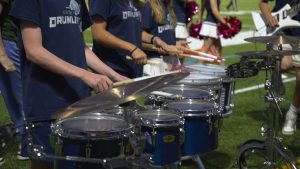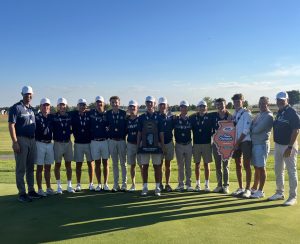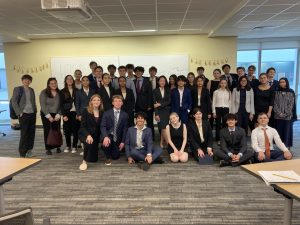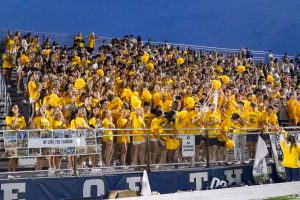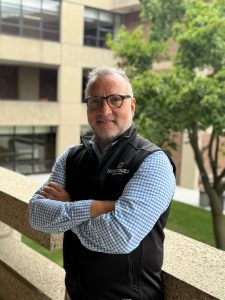Community packs Cornog to voice views on Seminar Day
On Feb. 20, hundreds gathered for a board meeting…about Seminar Day
March 8, 2017
After months of debate over the contentious Seminar Day, hundreds of students, faculty, and community members convened at a board meeting on Feb. 20, some to voice their perspectives on the day itself and others on how the issue of race is addressed.
Around 700 people packed into the Cornog Auditorium that Monday night and many more were turned away at the door.
“I was thrilled, absolutely thrilled by the turn out. I mean, the majority of the people were backing Seminar Day as is, but that’s great. We’re having a debate. That’s the kind of thing that we were hoping to inject into Seminar Day itself,” Parent Betsy Hart said.
As the board opened the meeting to “Citizen’s Comments,” many sides of the debate were addressed by the speakers, according to Hart.
However, limited to approximately an hour for this section, many were unable to speak. In the end, 19 of the estimated 100 people who requested to speak did.
“Half of the people who wanted to speak were refused the right to speak, arbitrarily,” Resident Robert Leonard said.
In respect to her own speech, junior Isabelle Hauser, who believed the day was unbalanced, said, “I was very nervous, coming from a very progressive school. I felt a little scared because I have been silenced before for what my views are, especially on social media. At the same time, I feel better about myself for speaking for those kids who I know have a different point of view.”
The overall opposing view was that New Trier day did not include a balanced set of seminars. The concern was that many were too liberal and there were no seminars or speakers to present the conservative point of view.
However, junior Arielle Imber, who led her own seminar last year and who was involved in the planning of this year’s event, saw otherwise.
“It’s interesting. I emailed ‘parentsofnewtrier.org’ a few weeks ago, and they sent me a response that included some authors whose views they feel weren’t included in Seminar Day. One of the authors is John McWhorter, whose work I had already used to inform one of my seminars,” Imber said.
“It’s concerning to me that the most outspoken of those who have opposed Seminar Day don’t actually know what’s going into these seminars. They’re just alarmed by a handful of speakers and seminar titles.”
Also addressing the opposition, senior Brett Zaslavsky said, “There are those who say the Seminar Day is biased, or one-sided. But to think that we, New Trier students, are susceptible to brainwashing, and incapable of forming our own thoughts after hearing other opinions, is demeaning.”
When asked what they believe the school should do to make the day more balanced, those against the day proposed multiple solutions.
“I was hoping for the board to add more speakers. I believe there’s room somewhere for Corey Brooks to talk to a few kids,” Hart said. “I believe there’s something that could be done.”
Hauser agreed with Hart, believing the day was unbalanced. “I personally wanted to be engaged in the Seminar Day and I approached my teacher about it a month or two in advance, and he said ‘it’s too late now,’ and I was kind of rejected.”
Resident Robert Leonard suggested including more seminars about the underrepresentation of black people in science courses. “People want to think that besides race, we’re all the same. All races are entitled to equal rights, but just lack skill set for certain things, that you can’t deny. Last year, California Schools came out with a quota–a knowledge scale. On average, you can’t deny, that Asians are the smartest, then Whites, then Hispanics, then Blacks, and then Native Americans. We need to accept these racial differences to solve the problem because we all want to be.
Furthermore, Hart said, “The irony is, that the people here who are saying ‘we’re for open minds, and we’re for inquiry’ are actually trying to shut us down, and are adamant that no speakers be added, that no other viewpoints be included.”
While much of the arguments mostly regarded the seminar day, many used it as a platform to discuss systematic racism and the general issue of race in this primarily homogenous community.
“When my children were small, my oldest daughter was blonde with blue eyes like my white husband. I was assumed many times, by fellow parents, to be the girl’s nanny. I would never equate these encounters with the struggles for racial rights, but these experiences have given me and my husband a small window into the lives of people who don’t fit into the majority description,”
Parent Ami Campbell said. “Seminar Day is a chance for our kids to look more closely through that window, and what they see might not be comfortable, or pretty, or easy for them to understand. But at least they’re seeing the experience that others have.”
From a student’s perspective on racism within the school, some believe it’s nonexistent. While Hauser recognized that racism and discrimination do exist around the world, she believes “there is no racial problem within New Trier.”
Pastor Corey Brooks from Project HOOD/New Beginnings Church described the day as a form of “indoctrination.” He believed the real problem was that “we are too focused on race. We are not treating everyone as individuals. I would urge the board to encourage students to look at people for who they are, not for what they appear to be on the outside.”
However, many believe the community needs to focus more on race, integrating discussion of the issue into everyday classes.
Campbell doesn’t believe the single day will be instantly transformational. “I’m not going to pretend that a single-day Seminar would click the kids completely, but if the students walk away with the germ of an idea then Seminar Day will have succeeded.”
Imber left the crowd on the following note as she addressed the parents directly. “Parents, if your student learns nothing about civil rights next week, I hope this will at least be an example of a meaningful and respectful exchange of ideas. If you’re opposed to the Seminar Day program, send your kid anyway. Send them with the intention of learning how to engage in civil discourse, how to be a responsible citizen, how to voice their opinions in a way that will be heard.”







































